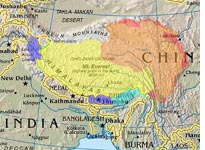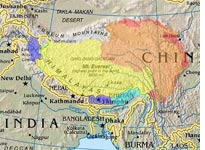|
|
Why Does China care about Tibet?
Plus, when are monks allowed to get violent?
为什么西藏对中国这么重要,另外,从什么时候开始僧侣被允许使用暴力了?
Posted Friday, March 28, 2008, at 7:04 PM ET
Tibet is a buffer between China and India, Nepal, and Bangladesh
Buddhist monks and other Tibetans began protesting in and around ffice:smarttags" />Lhasa on March 10, the anniversary of a major uprising against Chinese rule. Tensions have been flaring in the region ever since, with some protests turning violent. Tibet is a remote, impoverished mountain region with little arable land. Why does China care so much about keeping it?
自三月十日佛教僧侣及藏人在拉萨示威以纪念历史上的一次反中国统治运动。自示威者使用暴力以来区内局势前所未有地白热化。西藏是一边远贫穷缺少耕地的地区,为什么中国政府一定要保有它呢?
Nationalism. China invaded Tibet in 1950, but Beijing asserts that its close relationship with the region stretches back to the 13th century, when first Tibet and then China were absorbed into the rapidly expanding Mongol empire. The Great Khanate, or the portion of the empire that contained China, Tibet, and most of East Asia, eventually became known as China's Yuan Dynasty. Throughout the Yuan and the subsequent Ming and Qing dynasties, Tibet remained a subordinate principality of China, though its degree of independence varied over the centuries. When British forces began making inroads into Tibet from India in the early 1900s, the Qing emperors forcefully reasserted their suzerainty over the region.
民族主义,1950中国入侵西藏,但北京称汉藏关系可以追朔至十三世纪,当年汉藏首次联合一致对抗蒙古帝国,的迅速扩张,强大的可汗帝国历史上曾一统中原,西藏和西亚大部,在中国历史上称那一个朝代为元。自元,明,清以来,西藏一直是中国领土的一部分,虽然在这些朝代中,西藏实际是处在一种独立自主的状态。当英国在十八世纪通过印度入侵到西藏,清政府才被迫放弃对这一地区的宗主国权力。
Soon after, revolutionaries overthrew the Qing emperor—who, being Manchu, was cast as a foreign presence in Han-majority China—and formed a republic. Tibet took the opportunity to assert its independence and, from 1912 to 1950, ruled itself autonomously. However, Tibetan sovereignty was never recognized by China, the United Nations, or any major Western power. Both Sun Yat-sen's Nationalists and their rivals, Mao Zedong's Communists, believed that Tibet remained fundamentally a part of China and felt a strong nationalistic drive to return the country to its Qing-era borders. The 1950 takeover of Tibet by Mao's army was billed as the liberation of the region from the old, semi-feudal system, as well as from imperialist (i.e., British and American) influences. Resentment of the Chinese grew among Tibetans over the following decade, and armed conflicts broke out in various parts of the region. In March 1959, the capital of Lhasa erupted in a full-blown but short-lived revolt, during which the current Dalai Lama fled to India. He has lived there in exile ever since.
不久后,清朝的满族统治被汉人的革命推翻,中国进入半殖民状态的民国时期,西藏在1912年至1950年间借机宣布独立,并实行自治。但zd从来没有被中国,美国及其它主要的西方国家承认过。无论是孙中山的三民主义还是毛泽东的社会主义都认为,西藏是中华民族的不可分割的一部分,它的版图是自清朝以来就已经定下。1950年,毛的军队接管西藏称作是将西藏从旧的半封建制社会和美,英帝国主义者手中解放出来。但自那以后藏汉之间的怨恨开始增加,武装冲突在区内时有发生,1959年三月,首府拉萨暴发了一场空前的但短命的起义,之后,dl喇嘛就逃亡印度,开始他的流亡生涯。
There are also strategic and economic motives for China's attachment to Tibet. The region serves as a buffer zone between China on one side and India, Nepal, and Bangladesh on the other. The Himalayan mountain range provides an added level of security as well as a military advantage. Tibet also serves as a crucial water source for China and possesses a significant mining industry. And Beijing has invested billions in Tibet over the past 10 years as part of its wide-ranging economic development plan for Western China.
中国全力保有西藏还有他战略和经济上的考虑,该地区是中国和印度,尼泊尔以及孟加拉国之间的缓冲地带。喜玛拉雅山脉是天然的军事屏障。西藏也是中国重要的水源和矿业资源地。北京在过去数十年在西藏投入数十亿它是中国西部开发的一部分。
Bonus Explainer: When are Buddhist monks allowed to get violent? When it's for a compassionate cause. Monks and nuns in Tibet take at least two, and sometimes three, sets of vows that constrain their behavior. For most violations, the penalty is usually a confession that the act was committed. But if a monk were to kill another human being—one of the most serious violations of the Pratimoksha vows—he would be liable to expulsion from the monastery. That being said, there is a tradition in Tibetan mythology that could be used to justify taking violent action against an oppressor. The ninth-century king Langdarma, a follower of the Bön tradition, is popularly believed to have persecuted Buddhists during his reign. A monk assassinated him on the grounds that, by killing Langdarma, the monk was acting compassionately toward the tyrant—taking bad karma upon himself in order to spare the king from accumulating the same through his despotic actions. (由于藏文化知识的缺乏,这一段的翻译不太确切,译文仅供参考,欢迎指正的砖头。)
相关说明: 从什么时候开始僧侣被允许使用暴光力了呢?从怜悯心出发,西藏僧侣至少两次有时三次发誓要约束自己的行为,通常对违例的处罚是忏悔自己的行为失当,但是如果一个僧侣杀人,这是一非常严重的违规,是可能被开除出寺院的。这也被认为是藏传佛教中借以约束企图用暴力反抗统治者的行为。藏第九世王Langdarma是BON 系的追随者,被大多数人认为是在他统治时期曾迫害佛教徒。有僧人去刺杀他,这个僧人的这个举动是出于“怜悯”这一 |
-

-
Tibet is a buffer between China and India, Nepal, and Bangladesh (西藏是中国,印度,尼泊尔和孟加拉国之间 ...

|